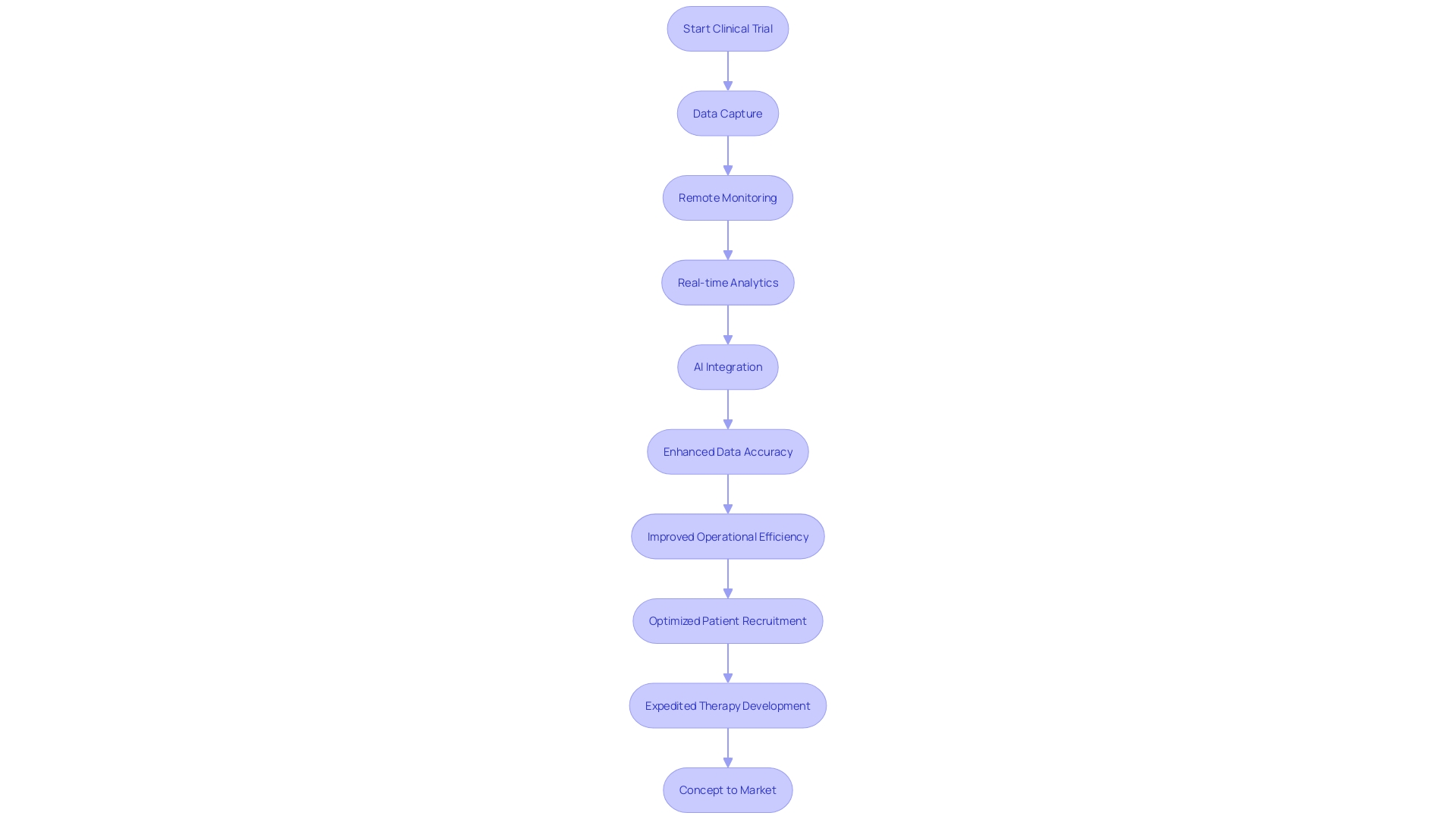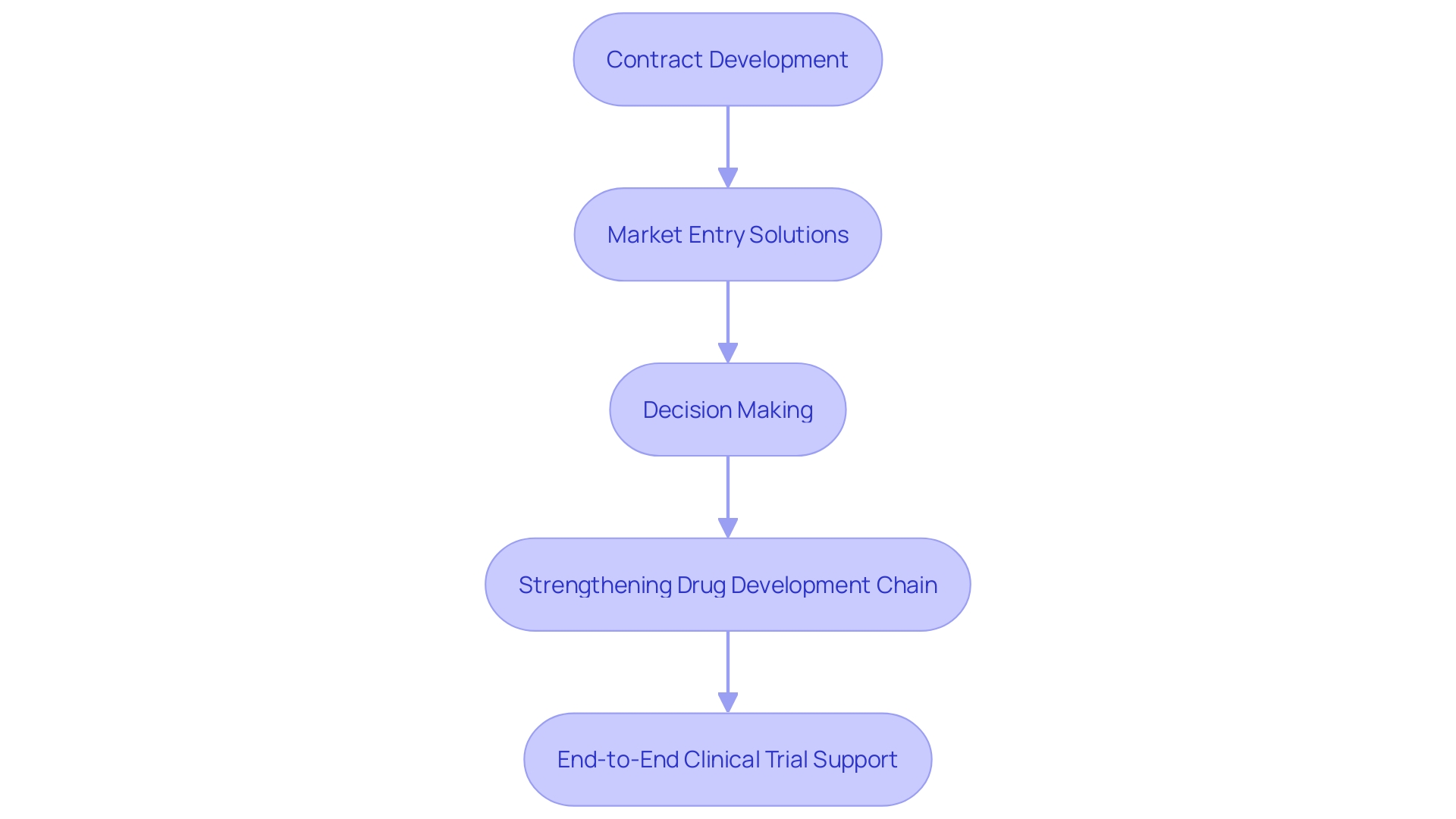Introduction
The landscape of clinical trials is constantly evolving, with Clinical Research Organizations (CROs) playing a vital role in orchestrating these complex studies. The selection of a top-tier CRO is crucial, as it directly impacts the management, efficacy, and overall success of clinical research.
In this article, we will explore the top 10 CRO companies that have distinguished themselves through their ability to manage multifaceted dimensions of clinical trials and their commitment to adapt and innovate in a field that demands constant vigilance and improvement. These companies have demonstrated expertise in specific therapeutic areas, global reach and capacity, innovative approaches to clinical trials, strong regulatory compliance, advanced technology and data analytics, a patient-centric approach, collaborative partnerships, proven track record of success, customized solutions for sponsors, and a commitment to quality and excellence. Join us as we delve into the world of clinical trials and discover the leading CRO companies driving advancements in medical research.
Top 10 CRO Companies for Clinical Trials
The landscape of clinical trials is ever-evolving, with Clinical Research Organizations (CROs) at the forefront of orchestrating these complex studies. The significance of selecting a top-tier CRO cannot be understated, as it directly impacts the management, efficacy, and overall success of clinical research.
For patients with rare diseases, like the one from rural Pennsylvania facing the prospect of international travel for a trial in Turkey, the CRO's role extends beyond the trial itself, encompassing the logistical support and guidance through daunting challenges such as visa acquisition and language barriers. Moreover, industry experts like Ken Getz have observed a paradigm shift in clinical trial design.
Emphasizing that the historical focus on 'great science' is now harmoniously paired with 'great execution'. This new trend is crucial in enhancing the efficiency and cost-effectiveness of clinical trials, aided by the integration of technologies like electronic data capture.
Treehill's insights further illuminate the critical nature of decision-making in clinical research. With approximately 80% of past decisions being identified as improvable in hindsight, it's clear that a meticulous approach by CROss in planning and executing each phase of a trial can significantly alter its course. This need for 'bulletproofing' decisions underscores the value of expertise and dedication that leading CROs bring to the table. In light of these perspectives, the top 10 CRO companies have distinguished themselves not only by their ability to manage the multifaceted dimensions of clinical trials but also by their commitment to adapt and innovate in a field that demands constant vigilance and improvement.
[Company Name]: Expertise in [Specific Therapeutic Area]
Navigating the complex landscape of clinical trials necessitates a CRO with specialized expertise in distinct therapeutic areas. [Company Name] distinguishes itself with an in-depth understanding and extensive experience in [Specific Therapeutic Area].
This expertise is not just about academic knowledge; it's about how this knowledge can be applied to real-world data (RWD) and clinical practice. As highlighted by Flatiron's research, which drew commentary from FDA members, the quality of RWD hinges on its relevance and reliability in addressing specific scientific questions.
This insight is critical for [Company Name], as it ensures that clinical trials are not only designed with precision but also yield results that are meaningful for clinical application. Moreover, the challenges addressed in a JAMA special communication—specifically the disconnect between clinical trialists and clinicians—underscore the importance of integrating clinical trials with clinical practice. [Company Name]'s team is at the forefront of this integration, striving to overcome the inefficiencies and limitations that have traditionally hamstrung the scope and impact of trials. By prioritizing the alignment of RCT designs with the broader context of clinical practice, [Company Name] ensures that their trials contribute to high-quality, actionable outcomes, addressing the clinical uncertainty that persists despite the tens of thousands of RCTs conducted annually.
[Company Name]: Global Reach and Capacity
Global scalability is imperative for clinical trial companies, enabling them to address the pressing issue of health care accessibility. [Company Name] leverages their longstanding trust within communities, as exemplified by Walgreens, to enhance clinical research reach.
By utilizing their established physical locations, such as stores and pharmacies, they can integrate clinical trial services into everyday health facilities. This approach not only facilitates diverse patient recruitment but also bridges care gaps through accessible screening and diagnostic services.
Moreover, [Company Name]'s international presence is not just about geographical coverage, but also about addressing the complexities patients face when participating in trials abroad. For instance, a patient with a rare disease from rural Pennsylvania may face the daunting task of navigating international travel to join a trial in Turkey.
The questions of obtaining visas, handling foreign documentation, and coordinating travel are significant barriers that [Company Name] aims to mitigate. Their infrastructure is designed to streamline these processes, ensuring that each step is as seamless as possible for participants, regardless of the trial's location. Their commitment to optimizing clinical trial management is further reflected in their meticulous approach to decision-making. By closely examining the myriad of decisions made years in advance, [Company Name] strives to ensure that every aspect of the trial, from design to execution, is robust and effective. This level of attention to detail is geared towards maximizing the efficiency and impact of their large-scale clinical trials.
[Company Name]: Innovative Approaches to Clinical Trials
Clinical trial companies like [Company Name] are revolutionizing the landscape of medical research by integrating state-of-the-art technologies such as artificial intelligence (AI) and machine learning (ML). These tools are not only refining the way trials are designed but also streamlining the recruitment process and bolstering the analysis of complex data.
For instance, a patient with a rare disease in rural Pennsylvania may face overwhelming challenges to participate in a trial overseas. The complexity of international travel, language barriers, and document management can deter participation, highlighting the necessity for innovative solutions to make trials more accessible and efficient.
As noted by Gregory Curfman from JAMA, the traditional separation between clinical trialists and clinicians results in inefficiencies and limited trial scopes. By leveraging advanced technologies, [Company Name] is addressing these critical issues, ensuring that trials are not only more inclusive but also that their findings are more readily applicable to clinical practice. This approach is informed by the realization that many past trial decisions, which impact future outcomes, could have been optimized with more careful planning and analysis, as reflected in the insights from transaction advisory experiences. Through such strategic innovations, [Company Name] is enhancing the very fabric of clinical trials, contributing to more robust and practical medical guidelines, and ultimately, fostering better patient outcomes.
[Company Name]: Strong Regulatory Compliance
Clinical trial companies like [Company Name] are pivotal in the discovery of medical advancements, ensuring that new treatments are both safe and effective. The meticulous adherence to regulatory guidelines is not just a formality but a cornerstone in guaranteeing the integrity and reliability of clinical trial data.
With the healthcare industry's increasing incorporation of AI and machine learning, the regulatory landscape is evolving. International bodies like the FDA and EMA are introducing stringent guidelines to navigate the risks associated with these technologies, emphasizing a "risk-based approach" and demanding transparency.
[Company Name] has demonstrated a deep understanding of these complex regulations, effectively implementing quality control measures that align with the latest standards. Their commitment is reflected in the rigorous conduct of clinical trials across all phases, from initial safety evaluations in small groups of healthy volunteers to broader assessments of efficacy and side effects in targeted patient populations. As the industry acknowledges the challenges posed by innovative technologies, [Company Name]'s steadfast compliance ensures that they remain at the forefront, shaping the future of patient treatment and care.

[Company Name]: Advanced Technology and Data Analytics
In the realm of medical advancements, clinical trial companies are pivotal in harnessing technology to manage the surge of data generated during clinical trials. As the volume of medical data grows exponentially—doubling every 70 days compared to every 50 years in 1950—clinical trial companies are adopting sophisticated technology to keep pace.
A Phase 3 trial now produces about 3.6 million data points, a threefold increase from a decade ago. To address this, [Company Name] integrates electronic data capture systems, remote monitoring, and real-time analytics to enhance data accuracy and operational efficiency.
The utilization of Artificial Intelligence (AI) begins at the inception of drug development, aiding in the identification of potential drug candidates and offering insights into the most effective targets for specific conditions. Ai's predictive capabilities are instrumental in modeling clinical trials, foreseeing potential challenges, and optimizing study designs. This advanced approach not only mitigates the risk of trial failures but also expedites patient recruitment—a critical hurdle in the clinical trial process. Consequently, these technological advancements enable swifter decision-making, accelerating the journey of new therapies from concept to market, ultimately elevating patient care and improving quality of life.

[Company Name]: Patient-Centric Approach
Clinical trials are the cornerstone of medical advancements, and at the heart of these trials are the patients whose participation is vital. [Company Name] emphasizes a patient-centric approach in clinical trials, recognizing that the involvement of patients in the planning and design of trials is essential.
As noted by Daniel J Herron, Vice President of Digital Offerings, Regulated Industries at RWS, patient-centricity involves 'actively involving patients in the planning and design of trials, so their perspectives and needs are considered.' This involves providing information that is not only accessible but also easy to comprehend, catering to a diverse population with different lived experiences.
By embracing diversity, equity, and inclusion, [Company Name] ensures that the nuances of varying conditions, backgrounds, and identities are acknowledged and addressed in their studies. The approach extends beyond just meeting regulatory requirements; it's about fostering an environment where patients feel valued, their time respected, and their contributions to science appreciated. This ethos has a tangible impact, as it leads to a more positive trial experience and enhances patient retention rates, ultimately resulting in more robust and meaningful research outcomes.
[Company Name]: Collaborative Partnerships
At [Company Name], we understand that the success of clinical trials hinges on strategic alliances and methodical planning. Our approach is to engage with investigators, sponsors, regulatory authorities, and ethics committees from the outset, aligning our efforts to ensure that every clinical trial we undertake is poised for success.
This proactive engagement is grounded in a hypothesis-driven framework that emphasizes the significance and impact of the clinical trial, as well as its readiness for implementation at the time of award. The planning phase of our clinical trials includes a thorough presentation of the rationale, drawing on prior studies and pre-clinical data that underscore the necessity and viability of the research.
We meticulously define the study objectives and protocol, ensuring that the trial is aptly designed to test the proposed hypotheses. Acquisition and management of study agents are carefully outlined, alongside protocols for ensuring adherence to GCP, GCLP, and GMP standards across all trial sites.
As we navigate the complexities of clinical research, particularly in the realm of rare diseases with unique and distinct needs, we are reminded of the urgency and scale of challenges ahead. The words of an industry expert resonate with our mission: 'Start early. What are some of the challenges remaining in this field? ... Funding to support natural history work has been very limited in the past; that is changing, and it's improving, but still in a way, we're seeing a couple of studies launch at a time, when what we really need are broad approaches where we can advance a lot of learning across many diseases at once.' It is with this understanding that [Company Name] commits to fostering robust partnerships and detailed planning, ensuring not only the successful execution of clinical trials but also contributing to the broader advancement of medical knowledge.
[Company Name]: Proven Track Record of Success
In the landscape of clinical research, the caliber of a Contract Research Organization (CRO) is often gauged by its history of success and the quality of data it produces. [Company Name] stands out with a formidable track record, showcasing a comprehensive portfolio of clinical trials that have been executed to perfection.
Their approach integrates not just scientific rigor but also strategic operational management, which has been increasingly recognized as pivotal in the industry. As Ken Getz noted, the dual focus on 'great science' and 'great execution' is essential, a philosophy that [Company Name] embodies through their meticulous planning and use of advanced technologies like electronic data capture.
Moreover, their dedication to refining the clinical trial process is evident in their commitment to thorough pre-study decision-making, as highlighted by the insights from Treehill's advisory experience. This ensures that each phase of the trial is not only well-conceived but also resilient to future challenges. Sponsors can entrust [Company Name] with the management of their clinical trials, confident in their ability to navigate complex logistics and produce reliable, high-quality data.

[Company Name]: Customized Solutions for Sponsors
At CMIC Group, the pioneering Contract Research Organization (CRO) in Japan, the focus is on delivering end-to-end solutions that are as unique as the clinical trials they support. Recognizing that the effectiveness of a product is intrinsically tied to the clinical trials' design—which ultimately shapes the product's market indication—CMIC provides bespoke services that span the entire pharmaceutical value chain. From contract development to market entry solutions, they ensure that the nuanced needs of their clients are met with precision.
Drawing on over three decades of industry innovation, CMIC's tailored approach extends to pharmaceutical companies, medical device manufacturers, academia, and beyond. Their commitment is to 'meet customers where they are' with exactly what is needed to advance their products. Acknowledging the criticality of decision-making in the early stages of drug development, CMIC places a strong emphasis on working through decisions with sponsors.
As articulated by industry experts, a significant proportion of decisions made years in advance could be better optimized with a CRO's careful guidance and expertise. By dedicating time and energy to 'bulletproof' these pivotal choices, CMIC helps to ensure that each link in the drug development chain is strengthened, reflecting a deep understanding of the client's timeline and the market's unmet needs. This approach not only meets sponsors' requirements but also anticipates the strategic moves that will define the success of a product in the real world.

[Company Name]: Commitment to Quality and Excellence
At the core of [Company Name]'s operations lies a rigorous dedication to top-tier quality and excellence. Their global presence, with subsidiaries across more than 50 countries and business activities spanning over 150 countries, is a testament to their leadership in the field.
[Company Name] has implemented comprehensive quality assurance systems to ensure that their services meet the highest standards, mirroring the meticulous approach taken by LEDVANCE in the general lighting sector. Much like LEDVANCE's commitment to conveying complex topics through accessible eLearning platforms, [Company Name] strives to deliver clear, reliable, and precise data that propels medical knowledge forward.
By integrating smart solutions and advanced technology into their operations, similar to LEDVANCE's smart home and smart building solutions, [Company Name] not only enhances the quality of their work but also ensures that it is inclusive and reaches a global audience. The translation of their materials into multiple languages reflects this inclusivity, making their research and findings accessible to a diverse international community. Such attention to detail and quality underpins [Company Name]'s reputation as a trusted partner in the advancement of medical science and patient care.
![Relationships and Concepts in [Company Name]'s Operations Relationships and Concepts in [Company Name]'s Operations](https://vectorly-files.s3.eu-central-1.amazonaws.com/7e5170f3-eeed-4ae0-a415-e37c583adb20.jpg)
Conclusion
In conclusion, the top 10 CRO companies highlighted in this article are leading the way in clinical trials. They excel in managing complex studies and demonstrate a commitment to adapt and innovate.
These CROs have expertise in specific therapeutic areas, ensuring precise trial design and meaningful results. They integrate trials with clinical practice, addressing the disconnect between trialists and clinicians for high-quality outcomes.
Global reach and capacity are crucial, allowing these CROs to address healthcare accessibility issues. They streamline processes for participants facing challenges in trials abroad, ensuring a seamless experience.
Innovative approaches to clinical trials are revolutionizing medical research. These CROs leverage advanced technologies like AI and ML to enhance efficiency and inclusivity.
Strong regulatory compliance is paramount to ensure safe and effective treatments. The leading CROs demonstrate an understanding of complex regulations and implement quality control measures aligned with the latest standards.
Advanced technology and data analytics play a significant role in improving data management and decision-making speed. These CROs integrate electronic data capture systems, remote monitoring, real-time analytics, and AI to enhance operational efficiency.
A patient-centric approach is emphasized by actively involving patients in trial planning and design. These CROs provide accessible information that caters to diverse populations' needs while fostering an environment where patients feel valued.
Collaborative partnerships are essential for successful trials. The leading CROs engage with investigators, sponsors, regulatory authorities, ethics committees from the outset aligning efforts for each trial's success. Proven track records of success distinguish these top CROs as they showcase comprehensive portfolios of executed trials integrating scientific rigor with strategic operational management. Customized solutions tailored to sponsors' needs set these CROs apart within the pharmaceutical value chain. They work closely with sponsors early on in drug development stages to optimize choices that strengthen each link in the development chain. At their core lies a commitment to top-tier quality and excellence reflected in global presence and comprehensive quality assurance systems. These CROs strive for clear, reliable data delivery while ensuring inclusivity through translation into multiple languages. Overall, these top 10 CRO companies drive advancements in medical research through their expertise, global reach, innovative approaches, regulatory compliance measures advanced technology utilization patient-centricity collaborative partnerships proven track records customized solutions commitment quality excellence.




